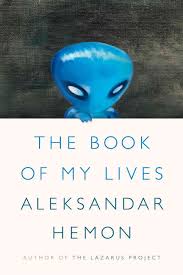To read the praised heaped upon the work of Aleskandar Hemon, you’d almost expect, upon opening The Book of My Lives (Farrar, Straus and Giroux, $25), to encounter the linguistic pyrotechnics of a Thomas Pynchon, or the James Joyce of Finnegan’s Wake. If so, you’d be disappointed. Hemon writes a clear, concise prose that stares reality in the face and never blinks. Indeed, he excels at easing readers into his idiosyncratic world, making us feel as if we, too, have lived his various lives.

The facts of those “lives” are fairly straightforward. Hemon was born and raised in Sarajevo, where he lived for the first 27 years of his life. After graduating from the university, he worked in radio and journalism, though — to hear him tell it — he showed few signs of the genius that would soon be attributed to him.
Shortly before the Seige of Sarajevo, Hemon received a scholarship from the United States Information Agency for a one-month stay in America. Not surprisingly, especially since his family had managed to escape the Siege, Hemon elected to remain in Chicago, where he was visiting a friend. Thus, he missed the war that infuses his writing, although its sorrows find there way into nearly essay in this book.
Philip Lopate says one of the central tasks of a writer of personal essays is to wrestle with “the stench of ego,” and Hemon has won that battle, hands down. “The trick,” according to Lopate, “is to realize that one is not important, except insofar as one’s example can serve to elucidate a more widespread human trait and make readers feel a little less lonely and freakish.” Throughout The Book of My Lives, Hemon does just that: he comes across as an underachieving misfit whose experiences make him seem, if anything, slightly less equipped than most of us to handle the trouble he finds himself in.
After a college prank in Sarajevo during which he and his friends dressed up like Nazis at a cocktail party, the partygoers are called into the state police for questioning and general humiliation. Hemon writes that the debacle left him feeling “like one of those Virgin Marys that show up in the frozen-food section of a supermarket in New Mexico or some such place — visible only to believers, ludicrous to everyone else.”
When he describes his life in Chicago, it is not as a writer who is becoming steadily more famous, but as a lovable loser, someone who rents a room in a house that reeks not only of dog feces and urine, but “generic miasma, a touch of rank cat litter…, fetid coffee, a whiff of weak disinfectant.” His jobs are unsatisfying, so he plays pick-up soccer with other immigrants, and chess in the Atomic Café with Peter, a man whose life has been far more punishing than his own. Yet Peter is never self-pitying and neither is Hemon.
That fierce lack of sentimentality is crucial to the success of the long final essay, “The Aquarium,” about the rare cancer that led to the death of his one-year-old daughter, Isabel. At the end of the essay, when most writers would be looking to draw a moral, Hemon refuses to acknowledge that suffering has been a path to salvation or was in any way ennobling for his wife, his other daughter, or himself: “We learned no lessons worth learning; acquired no experience that could benefit anybody. And Isabel most certainly did not earn ascension to a better place, as there has never been a place better for her than Teri’s breasts, Ella’s side, or my chest.”
Yet The Book of My Lives is dedicated to Isabel, “forever breathing on my chest,” and throughout this memorable collection, Aleskandar Hemon demonstrates that faithfully recording what has happened to us can be an act of quiet and, yes, even ennobling, courage.



